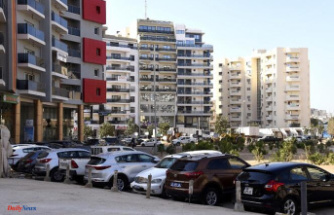One British Columbia mayor says wildfire smoke is the "biggest problem" for firefighters and residents alike, as this year's wildfire season continues.
Environment and Climate Change Canada stated that it had previously issued air-quality warnings. However, they have now downgraded the alerts about smoky sky, stating that the air quality will be worse near fires.
100 Mile House Mayor said that the smoke poses significant challenges to his city.
Mitch Campsall stated Saturday morning, "Our biggest problem is that we have so many smoke that it's hard to fight fire from the atmosphere because of the smoke." "That's becoming a major problem."
Federal meteorologist Derek Lee stated that while most Friday's air quality notices have been canceled, some areas near fires still have smoke bulletins. These could be upgraded if the weather worsens this weekend.
Lee stated that wildfire smoke will be a major issue in the region within 24 to 48 hours. "And if conditions worsen, we will have to issue our air quality advisories for these areas."
Although Friday's extensive smoke reports may have helped to improve the air quality, it will still be affected by wildfires.
Lee stated, "Near forest fires there is definitely a risk."
The Transportation Ministry of the Province urged drivers Saturday to stay clear of wildfire-affected areas.
The ministry tweeted that wildfires were "impacting travel in B.C." Please don't travel to evacuation areas or nearby communities.
According to provincial data, 1,096 wildfires have destroyed 238,971 hectares of land in B.C. This year, there have been 1,096 wildfires that have charred 238,971 hectares in B.C. According to the province, two-thirds of 16 new fires that were reported in the last 24 hours were believed to be caused by humans. The rest were set off by lightning.
According to Karley Desrosiers (provincial fire information officer for the B.C.), there are currently 305 wildfires burning in B.C. and roughly half have been declared "out-of-control". Wildfire Service. She stated that "resources were sparse", but that an anticipated deployment of firefighters had just arrived from Quebec Friday night.
She told CBC News Network that "Unfortunately there was a substantial amount of lightning forecast based on yesterday's forecast."
Most fires occur in the Kamloops or Kelowna areas. B.C. The Wildfire Service declared several fires "of note" or "out of control" Saturday.
Orders and alerts for evacuation
There are around 20 First Nations and regions that are currently under evacuation orders or alerts.
The Octopus Creek wildfire prompted the Regional District in Central Kootenay to issue an evacuation order on Saturday afternoon for five residents of Applegrove Road, 70 km south of Nakusp.
The fire covers an area of close to 1,200 hectares and burns on steep terrain. According to the wildfire service, the fire is being fueled by dry fuel and wind. Due to the fire, more than 160 properties have been placed on evacuation alert.
The Flat Lake wildfire erupted later Saturday and the Thompson-Nicola Regional district issued an evacuation order to rural properties south of 100 Mile House. It began on July 8, and has been estimated to cover 14,000 ha.
Around 9 p.m. on Saturday, the regional district issued an evacuation order for 60 properties east Ashcroft because of the Tremont Creek wildfire. The fire is currently out of control at 4,000 hectares. The fire has prompted nearly 700 properties to be placed on evacuation alert.
An evacuation order covering properties located between Stuart Lake, Babine Lake, and Fort St. James in central province has been reduced to an evacuation alert following firefighters' progress on the Camsell Lake wildfire. It is currently burning at 310 hectares.
Anyone placed under an evacuation order must leave the area immediately.
To assist those who need to evacuate from wildfire-prone areas, there are several evacuation centres located throughout the province. The Emergency Management B.C. website will help you locate the nearest centre.
Emergency Support Services is encouraged for all evacuees, regardless of whether they use services at an evacuation center.
Date Of Update: 18 July 2021, 11:10











